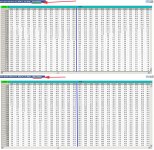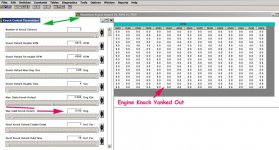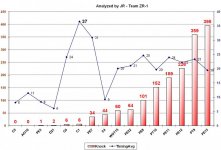The more Ethanol the less Mpg and the less Performance
C5s were really not designed for Ethanol use, from the fuel system, O2 sensors, etc
But the feds mandated this crap so nameplates like GM made you pay for it with less performance due to how the tuned the PCM
Your lucky if you only had E5 as here in the USA s few years ago mandated E15 and solely did it for votes to make all those who grow or make Ethanol
Ethanol does not make a good charge to the cylinders, it also makes the AFR leaner which makes the burn worse as leaner cylinder temps are the worse the charge is (fuel and air)
As temps raise the volume expands, and what this does is,
The colder the charge is then there are more molecules is which burns better but when temp is higher the charge expands, so now there are fewer molecules for same volume space which is a crappy burn causes engine to run way leaner (about 6-8% more) forcing the PCM to command the fuel injectors on longer, so MPG goes into the crapper.
This in turn causes more engine knock, so GM to only choice was to force the engine to de-tune by yanking a bunch of timing out that kills off torque
This process is time consuming from time knock is reported to PCM, latency and decay rates.
Time engine and PCM has recovered from knock it all start all over again with next knock
Now add hot weather so lousy hot air coming in, hence even worse charge and now knocking all the time
With enough knocks the PCM says F it and uses two timing tables and several knock tables and variables
One they call "high" octane and then there is a "low" octane tables
I show here those two tables as set in a C5 PCM calibration
If you look at set RPMs and cylinder volume points you can see how much timing the PCM is going to yank due to knock
PCM starts with High and what the timing it commands,
If knock start it looks at the same RPM/grm/cyl point of high and low and starts yanking between the 2 timing vales of both tables
If the knock continues then PCM says screw it and goes into the low octane timing table and will stay there from then on till it
sees at least 25% more fuel added to the gas tank
But this all starts all over again as soon as knocks happen again

Here is what the PCM in part does when knock happens
1. in this case will yank out as much as 12 deg of timing for each knock
2. Normal single knock as much as 8 deg timing

I have tuned the PCM countless of them are Corvettes and also analyzed the OBD data of owners of Corvettes and as example here
notice in this captured engine data of timing and knock
The more knock there was the less the timing commanded is started right before going into PE / WOT was 37 deg timing but due to knocks PCM only commanded 19 deg timing
So what is GOOD or OK for a waxer who owns a Corvette that never goes over 60 MPH on the slow lane on highway as not wanting to get bugs splattered on hood, they never use 200 HP and never hit the rev limiter
But for those of us always hit the rev limiter and push the Corvette design, Ethanol is crap, and we go so far to either run GAS only, no ethanol and/or add a water/Methanol kit to cool the cylinder temps down

Ethanol can cost up to 30 HP, reduced fuel mileage, degrade fuel system, such as the fuel sender in gas tank that degrades, causing reporting the wrong amount of gas in tank or even quit working, and degrade all 4 O2 sensors and degrade both CATs.
So what I do when custom tuning the PCM calibration is having to rework all the timing, fuel, air, knock and torque tables to reduce the effects of Ethanol and get far better performance and less banging the piss out of the Pistons and rings
So-called octane boosters in a can are useless and waste of money






